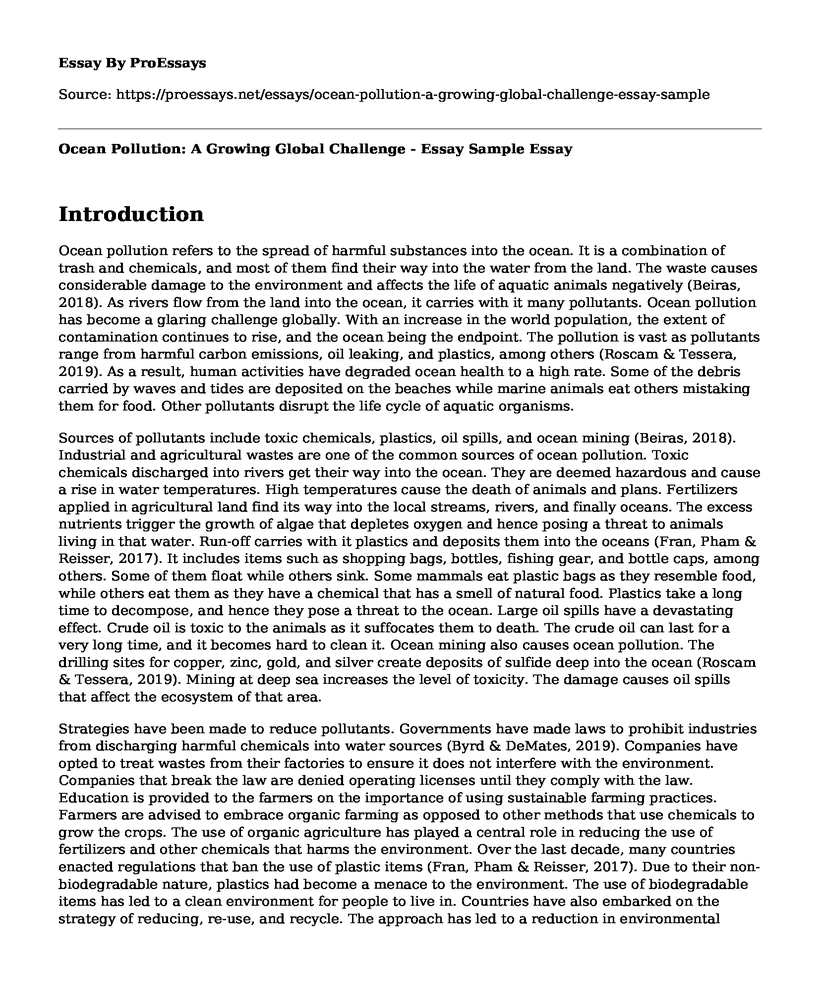Introduction
Ocean pollution refers to the spread of harmful substances into the ocean. It is a combination of trash and chemicals, and most of them find their way into the water from the land. The waste causes considerable damage to the environment and affects the life of aquatic animals negatively (Beiras, 2018). As rivers flow from the land into the ocean, it carries with it many pollutants. Ocean pollution has become a glaring challenge globally. With an increase in the world population, the extent of contamination continues to rise, and the ocean being the endpoint. The pollution is vast as pollutants range from harmful carbon emissions, oil leaking, and plastics, among others (Roscam & Tessera, 2019). As a result, human activities have degraded ocean health to a high rate. Some of the debris carried by waves and tides are deposited on the beaches while marine animals eat others mistaking them for food. Other pollutants disrupt the life cycle of aquatic organisms.
Sources of pollutants include toxic chemicals, plastics, oil spills, and ocean mining (Beiras, 2018). Industrial and agricultural wastes are one of the common sources of ocean pollution. Toxic chemicals discharged into rivers get their way into the ocean. They are deemed hazardous and cause a rise in water temperatures. High temperatures cause the death of animals and plans. Fertilizers applied in agricultural land find its way into the local streams, rivers, and finally oceans. The excess nutrients trigger the growth of algae that depletes oxygen and hence posing a threat to animals living in that water. Run-off carries with it plastics and deposits them into the oceans (Fran, Pham & Reisser, 2017). It includes items such as shopping bags, bottles, fishing gear, and bottle caps, among others. Some of them float while others sink. Some mammals eat plastic bags as they resemble food, while others eat them as they have a chemical that has a smell of natural food. Plastics take a long time to decompose, and hence they pose a threat to the ocean. Large oil spills have a devastating effect. Crude oil is toxic to the animals as it suffocates them to death. The crude oil can last for a very long time, and it becomes hard to clean it. Ocean mining also causes ocean pollution. The drilling sites for copper, zinc, gold, and silver create deposits of sulfide deep into the ocean (Roscam & Tessera, 2019). Mining at deep sea increases the level of toxicity. The damage causes oil spills that affect the ecosystem of that area.
Strategies have been made to reduce pollutants. Governments have made laws to prohibit industries from discharging harmful chemicals into water sources (Byrd & DeMates, 2019). Companies have opted to treat wastes from their factories to ensure it does not interfere with the environment. Companies that break the law are denied operating licenses until they comply with the law. Education is provided to the farmers on the importance of using sustainable farming practices. Farmers are advised to embrace organic farming as opposed to other methods that use chemicals to grow the crops. The use of organic agriculture has played a central role in reducing the use of fertilizers and other chemicals that harms the environment. Over the last decade, many countries enacted regulations that ban the use of plastic items (Fran, Pham & Reisser, 2017). Due to their non-biodegradable nature, plastics had become a menace to the environment. The use of biodegradable items has led to a clean environment for people to live in. Countries have also embarked on the strategy of reducing, re-use, and recycle. The approach has led to a reduction in environmental pollution caused by plastics.
References
Beiras, R. (2018). Marine pollution: Sources, fate, and effects of pollutants in coastal ecosystems. Amsterdam, Netherlands; Cambridge, MA: Elsevier.
Byrd, R., & DeMates, L. (2019). Sustainability made simple: Small changes for big impact. Lanham: Rowman & Littlefield.
Fran, Pham, C. K., & Reisser, J. (2017). Plastic Pollution. Place of publication not identified: Frontiers Media SA.
Roscam, A. M., & Tessera, T. (2019). Plastic soup: An atlas of ocean pollution. Washington [District of Columbia]: Island Press.
Cite this page
Ocean Pollution: A Growing Global Challenge - Essay Sample. (2023, Apr 05). Retrieved from https://proessays.net/essays/ocean-pollution-a-growing-global-challenge-essay-sample
If you are the original author of this essay and no longer wish to have it published on the ProEssays website, please click below to request its removal:
- Weather and Disasters
- Nancy vs. RPI Firm Case Study
- Disaster and Post-Traumatic Experiences Essay
- Essay Example on Leadership in Disaster: The 3 C's of Command, Control, and Curbing
- Essay Example on Cloud Seeding: Successful Weather Modification Techniques?
- Global Warming to Impact NC Coast: Action Needed Now! - Essay Sample
- Essay Example on Renewable Energy: Averting Global Warming & Collateral Damage







